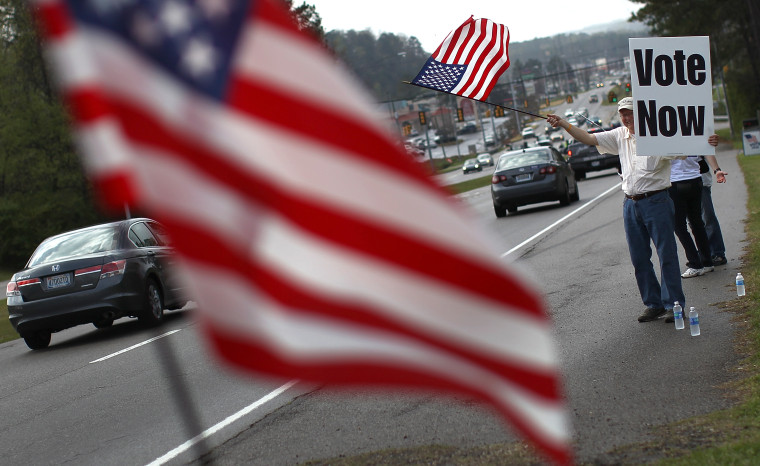Tuesday is the first test of Alabama’s voter ID law – and the state’s Republicans are desperate to dig up some voter fraud. So desperate, in fact, that they’re offering a $1,000 reward to anyone who helps them find any.
They haven't succeeded yet. But the ID law has already stopped at least one legitimate voter from casting a ballot.
Bill Armistead, the Alabama GOP chair, wrote on the party's website Monday that Republicans will fork over the cold hard cash to anyone who provides “information that directly leads to a conviction of a felony for voter fraud.” Signs saying “Reward – Stop Voter Fraud,” and directing people to call a toll-free hotline, will be placed at polling sites around the state both for Tuesday's primaries and November's general election, Armistead added.
The party isn’t likely to be on the hook for a big payout. A detailed analysis of election-fraud cases conducted by News 21 in 2012 and going back over a decade, found just one isolated case of voter impersonation fraud, the kind that would be stopped by voter ID.
A call made Tuesday morning to the hotline number went to the Alabama Republican Party office. Zach Bowman, the party’s director of voter engagement, said reports of problems had already come in.
Was this the elusive voter fraud, at last? Well, no, said Bowman. It was just a few polling places that hadn't opened on time.
Was there a concern that the monetary reward could cause some people to be overzealous in looking to find voter fraud, potentially causing problems for legitimate voters looking to cast a ballot?
"I'm sure that would always be a concern," said Bowman, adding that the goal was simply to ensure that polling places are enforcing the ID law correctly.
Democrats questioned the incentive strategy.
"If you have to put $1000 out there, its almost like you’re trying to get people to make something up," said Nancy Worley, the chair of the state Democratic party. Worley accused Republicans of "trying to stir up an issue that doesn’t exist."
In his online column, Armistead also wrote that “Alabama has four counties with more registered voters than the adult population in those counties." Because of poorly maintained voter rolls, many counties across the country have similar discrepancies, which Republicans say create opportunities for voter fraud.
Voter fraud may be hard to find, but it didn't take long Tuesday for the ID law to disenfranchise a valid voter. Willie Mims, 93, showed up to vote at his polling place in Escambia County Tuesday morning. Mims, who is African-American, no longer drives, doesn’t have a license, and has no other form of ID. As a result, he was turned away without voting. Nor was Mims even offered the chance to cast a provisional ballot, as the law requires in that situation.
Jenny McCarren of Empower Alabama, a progressive group that gave Mims a ride to the polls, recounted the story for msnbc. McCarren said Mims’s voter file showed he has voted in every election since 2000, as far back as the records go.
Alabama’s voter ID law was passed in 2011, with Republicans citing the threat of fraud. But the state never sought to clear the measure with the Justice Department, as required at the time by the Voting Rights Act—an indication, perhaps, that it doubted whether the law would be approved. As a result, it didn’t go into effect until after the Supreme Court’s ruling last year in Shelby County v. Holder. That ruling weakened the Voting Rights Act by removing the need for states to get federal permission to enact their elections laws.
There are no official estimates of how many Alabamans lack ID. But nationwide, most studies put the figure at around 10%, and as high as 25% for African-Americans.
Unlike some other states’ voter ID laws, Alabama’s has a loophole: It allows people to vote without ID if two poll workers can vouch for them. The NAACP Legal Defense Fund has called that aspect of the law “an illegal relic of the Jim Crow South,” when similar tests were used to keep black voters from the polls.
